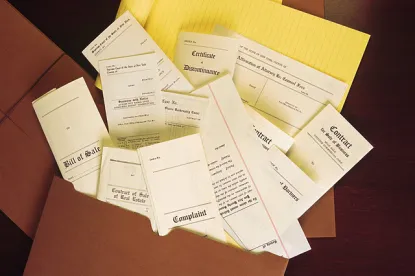You and Company X have been sued in Pennsylvania state court. You are a Pennsylvania citizen and Company X has its principal place of business and place of incorporation in Delaware. After noticing that you have not yet been served with the lawsuit, you quickly file a notice of removal to federal court before service can be made. This practice is known as “snap jurisdiction.” Snap jurisdiction is “largely a product of the Internet era,” which has made it possible for defendants to monitor state court dockets electronically and quickly file a notice of removal before an in-state defendant is served.2
The practice of snap jurisdiction, also referred to as “snap removal” or preservice removal, has created turmoil in federal district courts over the meaning of the forum-defendant rule.3 The forum-defendant rule in 28 U.S.C. § 1441(b)(2) provides that a civil action may not be removed from state court to federal court on the basis of diversity jurisdiction if “any of the parties in interest properly joined and served as defendants is a citizen of the state in which the action is brought.”4 In recent years, the federal district courts have been faced with a dilemma of how to interpret the language “properly joined and served” in an era of electronic dockets, which has enabled defendants to remove litigation sometimes before they have been served.5
DISPARITY AMONG THE COURTS
There are two different schisms in the approaches utilized by courts that condone snap jurisdiction. In particular, the courts are split over the issue of 1) who is an appropriate party to remove and 2) when removal is appropriate.
The “Who” Schism
The first schism is whether only the non-forum defendant can remove the case. Some courts have held that only nonresident defendants may utilize snap removal; an unserved resident defendant cannot seek removal. Therefore, in the hypothetical provided above, you would be unable to remove despite not yet being properly served and joined because you are a citizen of the forum state. On the other hand, some courts have held that either a resident or a nonresident defendant can remove prior to service.
The “When” Schism
A second key distinction is whether removal is proper only when none of the defendants have yet to be served. In other words, some courts hold that removal is proper only when the non-forum defendant removes after “at least one defendant has been served.”8 Requiring service on at least one defendant forecloses the possibility of snap removal when a resident defendant is the sole defendant in a case.9 Therefore, modifying the hypothetical above, if you were the sole defendant in the case, snap removal would not be a possible strategic choice for you―although there may be some situations where snap removal could be potentially beneficial to a sole defendant. Conversely, other courts have held that removal is proper before any defendant has been served.10
Motivating much of the disagreement among the district courts is a concern with gamesmanship, and, particularly, efforts to forum shop.11 Some scholars argue that applying the “plain meaning” interpretation of 28 U.S.C. § 1441(b) allows and perhaps even encourages defendants to engage in gamesmanship.12 Some critics argue that it is unjust for a properly joined defendant to monitor the electronic docket and remove prior to being served, thereby circumventing the rules of civil procedure.13 Because of concerns about defendants “gaming” the system, courts have created much confusion by applying a wide variety of approaches to the question of snap jurisdiction.14
THIRD CIRCUIT CLARITY
The Third Circuit is among the first circuits to provide some guidance on the issue of snap jurisdiction in Encompass Insurance Company v. Stone Mansion Restaurant, Inc.15 In Encompass, the plaintiff insurance company, a citizen of Illinois, brought suit against Stone Mansion Restaurants, a Pennsylvania citizen, in Pennsylvania state court to seek contribution for an underlying tort action.16 After counsel for Stone Mansion was sent a copy of the filed complaint and a service acceptance form, but prior to formal acceptance of service, Stone Mansion removed the case to the Western District of Pennsylvania.17 On appeal, the Third Circuit held that the actions of Stone Mansion were consistent with the “plain meaning” of 28 U.S.C. § 1441(b).18 First, the court looked to the text of the statute and determined that the text was unambiguous.19 It noted that the plain meaning would be adhered to unless doing so would lead to “absurd or bizarre results.”20 Next, the court looked to the purpose of Section 1441 and held that Congress enacted the rule to prevent the fraudulent joinder of a defendant by the plaintiff and to prevent “favoritism for in-state litigants.”21 Therefore, the court held that allowing snap removal by an in-state defendant not yet properly served “abides by the plain meaning of the text” and is consistent with congressional intent in enacting Section 1441(b).22 Thus, the court held that snap removal was acceptable under 28 U.S.C. § 1441(b).
The clarity provided by the Third Circuit in Encompass is likely to be instrumental in resolving the split in opinion among the district courts. Currently, the district courts across the country apply a number of different approaches:
-
Resident versus non-resident removal as acceptable removing party; or
-
None of the defendants served versus the forum defendant not served as acceptable timing for removal.
In short, the current landscape is one of great uncertainty outside the Third Circuit. Because it is unlikely that the Supreme Court will step in to resolve the issue in the near future, the Third Circuit’s approach will take on additional weight in the interim due to the absence of higher authority. Therefore, the plain meaning approach adopted by the Third Circuit will likely assume a place of preeminence as other district and circuit courts grapple with this issue.23
1 Special thanks to K&L Gates summer associate Nadia Brooks for her assistance with this article.
2 Arthur Hellman et al., Neutralizing the Stratagem of Snap Removal: A Proposed Amendment to the Judicial Code, 9 FED. CTS. L. REV. 103, 104 (2015).
3 Id.
4 28 U.S.C. § 1441(b)(2) (emphasis added).
5 Hellman, supra note 2, at 104; see In re Jean B. Mcgill Revocable Living Tr., No. 16-CV-707-GKF-TLW, 2017 WL 75762, at *3 (N.D. Okla. Jan. 6, 2017) (holding that removal was not appropriate when the forum defendant sought to remove); Young v. Bristol-Myers Squibb, Co., No. 17-609-LPS, 2017 WL 2774735 at *2 (D. Del. June 27, 2017) (holding that removal was proper when none of the defendants had been served); Seong Ho Hwang v. Gladden, No. 3:16-cv-502-SRW, 2016 WL 9334726, at *8 (M.D. Ala. Dec. 21, 2016) (holding that the forum defendant could remove so long as it had not been served).
6 See In re Jean B. Mcgill, 2017 WL 75762, at *3 (holding that removal was not appropriate when the forum defendant sought to remove); see also Smethers v. Bell Helicopter Textron, Inc., No. 6:16-CV-58, 2017 WL 1277512 (S.D. Tex. Apr. 3, 2017) (holding that “as the lone, forum-resident defendant, the purpose of the statute (i.e., ‘to provide a non-resident defendant with a non-prejudicial forum’), is not served by allowing such gamesmanship to stand”); Hellman, supra note 2, at 105 (citing Breitweiser v. Chesapeake Energy Corp., No. 3:15-CV-2043-B, 2015 WL 6322525, at *6 (N.D. Tex. Oct. 20, 2015)).
7 Young, 2017 WL 2774735 at *2 (holding that when none of the defendants have been served, including the resident defendant, removal by the resident defendant was proper); Seong Ho Hwang, 2016 WL 9334726 at *8 (applying the “plain language of the statute in holding that forum defendants may remove cases to federal court, so long as they have not been served”); see also Hellman, supra note 2, at 105 (citing Munchel v. Wyeth LLC, No. 12-906-LPS. 2012 WL 4050072 (D. Del. Sept. 11, 2012)).
8 Gentil v. Boigen Idec., Inc., 934 F. Supp. 2d 313, 322 (D. Mass. 2013); R&N Check Corp. v. Bottomline Tech., Inc., No. 13-cv-118-SM, 2013 WL 6055233, at *3 (D. N.H. Nov. 15, 2013); see also Hellman, supra note 2, at 105 (quoting Gentil, 934 F. Supp. 2d at 322).
9 See R&N Check Corp., 2013 WL 6055233, at *4.
10 See also Hellman, supra note 2, at 105 (citing Valido-Shade v. Wyeth, 875 F. Supp. 2d 474, 476 (E.D. Pa. 2012)).
11 Schilmiller v. Medtronic, Inc., 44 F. Supp. 721, 725 (W.D. Ky. 2014); Hellman, supra note 2, at 108; see R&N Check Corp., 2013 WL 6055233, at *4.
12 Hellman, supra note 2, at 108.
13 See id.
14 In February 2020, several members of the House introduced the Removal Jurisdiction Clarification Act of 2020 (H.R. 5801). Under this proposed bill, if the plaintiff served an in-state defendant within a certain time period specified by statute following a snap removal, the federal court would be required to remand the case to state court. See Congressional Research Service, Make It Snappy? Congress Debates “Snap” Removals Of Lawsuits To Federal Court (Feb. 25, 2020). As of the date of this article, this bill has not advanced beyond its introduction in the House.
15 902 F.3d 147, 149 (3d Cir. 2018).
16 Id.
17 Id. at 150.
18 Id. at 154.
19 Id. at 152.
20 Id.
21 Id. at 153.
22 Id.
23 See Doe v. Valley Forge Mil. Acad. & Coll., No. 19-1693, 2019 U.S. Dist. LEXIS 117633 (E.D. Pa. July 15, 2019) (holding that in addition to complying with 28 U.S.C. § 1441(b), a defendant seeking to remove a case must also comply with all of the requirements of 28 U.S.C. § 1446(d)); Brown v. Teva Pharm., Inc., 414 F. Supp. 3d 738 (E.D. Pa. 2019) (holding removal is not effectuated until all of the requirements of 28 U.S.C. § 1446(d) (i.e., filing in federal court, notifying adverse parties in writing, and filing in state court) are completed.); see also Trias v. QVC, No. 20-813, 2020 U.S. Dist. LEXIS 57840 (E.D. Pa. Apr. 2, 2020) (holding that notice given to adverse parties must comply with Rule 5 of the Federal Rules of Civil Procedure (FRCP) to effectuate removal).





 />i
/>i

